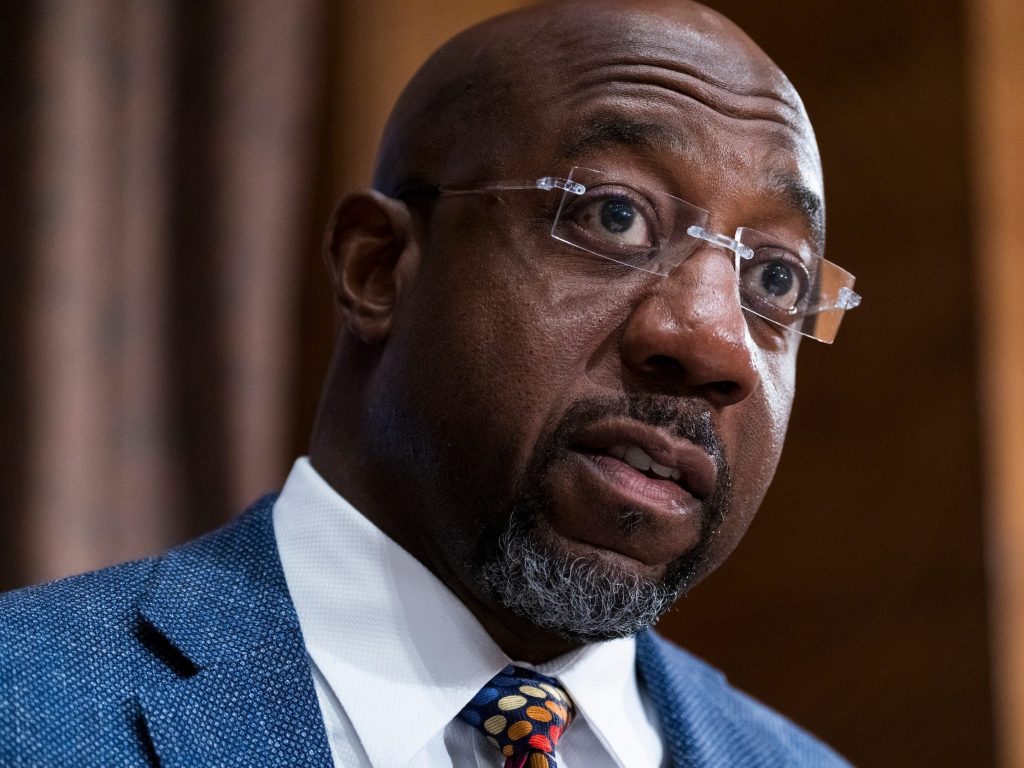- Sen. Raphael Warnock is readying an amendment to the inflation deal that would expand Medicaid.
- An estimated 4 million people would enroll in the program, federal projections show.
- One estimate shows it could cost the federal government $125 billion.
Democratic Sen. Raphael Warnock of Georgia wants to see his party's latest $740 billion inflation deal go further on healthcare.
He'll be introducing an amendment that would offer government-funded health insurance to 4 million people with earnings below the federal poverty level, his office confirmed to Insider.
Warnock will introduce the amendment when the Inflation Reduction Act undergoes "vote-a-rama," a marathon session of amendment votes that could end up changing the final draft of legislation. The vote-a-rama could happen as soon as this weekend.
The news about the amendment comes after a coalition of advocates in southern states sent a letter to senators Wednesday urging them to support Warnock's Medicaid amendment.
Without it, they warned, "the proposed bill would leave behind the poorest Americans at a time when growing abortion restrictions make access to comprehensive health care even more urgent."
"Closing the Medicaid coverage gap is the most racially equitable health policy this Congress could enact," the coalition said.
It's not clear how many senators will vote in favor of the amendment, and Warnock's office didn't specify how precisely it would be designed.
Depending on how the amendment is written, it could cost the federal government $125 billion through 2025, according to projections from the Congressional Budget Office, the federal government's nonpartisan scorekeeping agency.
States already have the option to expand Medicaid under the Affordable Care Act, colloquially known as "Obamacare." In the majority of states that have done so, people earning $13,590 or less for a single person or $27,750 for a family of four pay nothing or very little for healthcare.
States that didn't expand Medicaid, however, have higher rates of uninsured people. An estimated 4 million more people would be able to join Medicaid if all states expanded the program, according to a federal government report compiled by the Department of Health and Human Services.
Several Republican-led states refuse to expand Medicaid, largely out of ideological opposition but also saying they don't want to pick up 10% of medical costs they'd be on the hook for under Obamacare. Under the law, the federal government picks up the remaining 90% of costs.
Today, 12 states still haven't moved to expand Medicaid, including Georgia, Florida, and Texas.
Warnock is up for reelection in Georgia. In November he'll face off against Republican Herschel Walker, a former star athlete who has the endorsement of former President Donald Trump.
The senator has called Medicaid expansion an equity issue. At least 275,000 people in Georgia are uninsured because they can't access the program, he said during a hearing in October 2021.
So far, the Inflation Reduction Act contains provisions to allow the federal government to set prices of some prescription drugs for seniors and would funnel billions of dollars to Obamacare "marketplace" health insurance. These plans are sold by private insurers to middle- and higher-income people, but the federal government helps to pay the costs of premiums.
Provisions for Medicaid were in the Build Back Better Act, the $2 trillion legislation that passed the US House but failed to gain support in the Senate. Republicans, who hold 50 seats in the Senate, opposed the plan as did Democratic Sens. Joe Manchin of West Virginia and Kyrsten Sinema of Arizona.
Under that bill, people with incomes below the poverty level would have been able to access private insurance in the Obamacare "marketplaces." The federal government would pay the full cost of healthcare premiums and would contribute to extra healthcare expenses incurred at the doctor's office or in a hospital.
It's not clear whether Warnock is pursuing the same approach with his amendment. Paying for private insurance is more expensive than paying for Medicaid.
Majority Leader Chuck Schumer said Thursday on the Senate floor that the chamber would vote on the Inflation Reduction Act "soon." The parliamentarian, who is the referee for the Senate, still has to review the bill to make sure it fits the Senate's arcane rules for reconciliation, which would allow Democrats to pass the bill with 50 senators as well as a tie-breaking vote from Vice President Kamala Harris.
But the legislation is not a done deal since Sinema has not yet taken a position on it.

